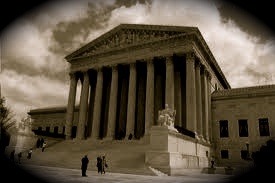
In a case brought against Shell in New York by alleged victims of human rights abuses in Nigeria, the UN Human Rights Office (Office of the High Commissioner for Human Rights – “OHCHR”) has filed an Amicus Brief. OHCHR takes view that grave violations of international humanitarian law have universal application and this could be enforced by national courts, such as US Federal Courts. This particular case though was brought under a long-standing US law – the Alien Tort Statute. (In past two decades we facilitated citizens of Bosnia & Herzegovina – women who were systematically raped – bring and win cases against Radovan Karadzic under this Statute).
Human Rights chief Navi Pillay, referring to this case, Kiobel v Shell, said, “governance gaps created by the rising reach and influence of business actors have not been matched by a similar rise in the capacity of societies to manage their impact and ensure accountability for adverse human rights impacts resulting from business activities. The US Supreme Court is scheduled soon to hear/rule on the broad applicability of such cases with US Courts as venue , (see below). The full Release from OHCHR is Linked and below -
www.ohchr.org/EN/NewsEvents/Pages/CorporationsMustBeHeldAccountableForHRViolations.aspx
By Ambassador Muhamed Sacirbey – Follow @MuhamedSacirbey
Facebook = Become a Fan at “Diplomatically Incorrect”
Twitter – Follow us at DiplomaticallyX
OHCHR Statement:
“Corporations must be held accountable for human rights violations
The lawsuit, Kiobel v Royal Dutch Petroleum (Shell), was brought in 2002 by 12 Nigerians who allege that the company “aided and abetted” the human rights violations committed against them by the Nigerian Government in the Ogoni region of the Niger Delta. Shell, through a Nigerian subsidiary, was involved in oil exploration and production in the region between 1992 and 1995, at the time the abuses allegedly occurred.
This case is one of several brought against Shell in relation to the violent suppression of the Movement for the Survival of the Ogoni people, a group campaigning for the rights of local people and protesting against pollution caused by oil companies. Nine of the Movement’s members, including its leader, well-known writer Ken Saro-Wiwa, were hanged in 1995 after being convicted of murder by a military tribunal. The executions of the ‘Ogoni nine’, as they are known globally, were condemned by governments and human rights activists around the world.
Since the Second World War and the Nuremberg war crimes trials, international law has held that human rights abuses can be prosecuted around the globe. A motion to have the original case dismissed on the grounds that it could more conveniently be heard in England was overturned, with the Court of Appeals ruling the United States was a proper forum because the defendants had an office in New York.
In 2009, after more than a decade in the American courts, Shell settled three of the actions brought on behalf of the widow of Saro-Wiwa and others, offering a total of $15.5 million as compensation to a number of individuals, to cover legal costs of the plaintiffs and to set up a social fund for the community.
The company denied that in offering a settlement it was conceding any wrongdoing. In a statement issued at the time, Shell said it hoped the settlement would “assist the process of reconciliation and peace”. The payments, the statement said, were made “in recognition of the tragic turn of events in Ogoni land, even though Shell had no part in the violence that took place.”
The remaining case, Kiobel v Royal Dutch Petroleum, was brought principally on behalf of the widow of another of the ‘Ogoni Nine’, Dr Barinem Kiobel, and 11 others. They sued under a little-used American statute, the Alien Tort Statute of 1789, which gives American courts the jurisdiction to rule on human rights abuses perpetrated against foreign citizens outside the United States.
The specific allegations in the case charge that the Nigerian military and police, with logistical and financial support from Shell, “engaged in a widespread and systematic campaign of torture, extrajudicial executions, prolonged arbitrary detention, and indiscriminate killings constituting crimes against humanity to violently suppress this movement.”
Speaking recently to the first meeting of the UN Working Group on human rights and business, Human Rights chief Navi Pillay, referring to Kiobel v Shell, said, “governance gaps created by the rising reach and influence of business actors have not been matched by a similar rise in the capacity of societies to manage their impact and ensure accountability for adverse human rights impacts resulting from business activities.”
In an earlier phase in the case the argument that the Alien Tort Statute should cover corporations as well as individuals enabling the court to hear the allegations of human rights violations being made against Shell, was rejected, but the Supreme Court in a move regarded as likely to settle the matter once and for all, has now agreed to hear the case.
The UN Human Rights office, along with several other interested parties has filed an amicus curiae brief in support of the view that corporations should be held accountable. An amicus curiae is a person who participates in a case not as a party but as a ‘friend of the court’.
High Commissioner Pillay, in her application, argues that “holding corporations liable for human rights violations is fully consistent with international law.” In particular, the High Commissioner argues that, “corporations are not immune from responsibility under international law if they engage in, or are complicit in, conduct amounting to international crimes such as genocide, crimes against humanity or war crimes.”
The United States Government also intervened in the case as an amicus curiae in support of the view that there should be no distinction between individuals and corporations, arguing that “the concept of corporate liability is a well-settled part of our “legal culture””.
The case is scheduled for hearing in February 2012.

